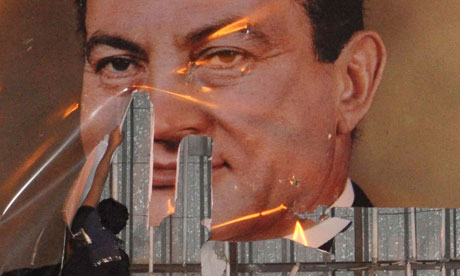
(A protester removing a poster of Mubarak - AP)
The highly anticipated trial of former Egyptian president Hosni Mubarak will commence in a few weeks' time. It is believed that he may face the death penalty if convicted over charges of corruption and intentionally killing protesters during Egypt's 18-day revolution which prompted his resignation.
The trial is set to start on August 3 when Mubarak's sons, Jamal and Ala'a, will also be tried on charges of corruption.
Bravo! Justice must be served, and those who have done wrong must be punished according to the law for the damage they have caused to this great nation over three decades.
Yet, as much as one would like to end the story by saying "...and the people of Egypt lived happily ever after", it might just be too premature to say so; even worse, the story might have a Hollywood thriller-like sequel where it turns out that the villain who was banished was only a small part of a much bigger plot.
We only need to review some of the decisions and acts conducted by Egypt's Supreme Council of the Armed Forces to start wondering if anything has really changed, apart from the figurehead. The military council has been the de facto ruler of the country since Mubarak was toppled (some also argue that it has been the real ruler of the country ever since the 1952 Revolution which brought down the monarchy and exiled Farouq I, the last king of Egypt).
Yes, Mubarak will stand trial and there has been no shortage of criticism of him, his family and high-ranking officials of his former regime in the Egyptian media -- but does that really signify that the country is now 'free'?
Let us look at it this way. Under Mubarak, enemies of the regime were always tarnished in the state-controlled media; all that has happened now is that Mubarak and Co became the enemy rather than the 'regime' and thus are considered 'fair game' by the media -- perhaps with a bit of vengeance as journalists with axes to grind had to wait 30 years for a chance to rip the former president to bits.
But would these journalists who now claim that they have been 'liberated' and are free to speak as they please, dare to criticise the current 'regime' (the Supreme Council of the Armed Forces) in the same manner in which they tackle Mubarak's former regime? The issue with editorial integrity is that it can't be simply promised and it must be proven -- so until we witness otherwise, one would be well-advised to remain slightly skeptical. Especially that so far, those who dared question the military quickly realized that the same intolerance to critical voices which once characterized the Mubarak era still exist today.
One only has to review the case of Maikel Nabeel Sanad, a blogger who was arrested by the Military Council on March 28, for "insulting the military" and "spreading false information".
Arrest of journalists and bloggers
Now I am not a big fan of Maikel's, particularly not of his fondness for Israel (a matter which has nothing to do with his arrest by the way) -- but to be allegedly arrested for saying that the "military supported the police during the revolution and continued to arrest people even after the fall of Mubarak" is a serious matter and a dangerous indicator of the way this council intends to govern.
Obviously, there have been other incidents -- such as the reported summoning of blogger Hussam Al Hamalawi following a TV debate where he said that any organization which received taxes from the people should be questioned, the reported questioning of Al Wafd editors Hossam Al Suwaifi and Syed Abdul Ati, the editor-in-chief of the newspaper's weekly edition and journalist Nabeel Sharaf Eddine, among others. Unsurprisingly, many of the Military Council's actions have recently been flagged and questioned by organisations such as Human Rights Watch, the Committee to Protect Journalists (CPJ) and Amnesty International -- hardly a sign of progress as these organisations had similar issues with the Mubarak regime.
On the other hand, if you ask some of the veteran journalists in Egypt they might tell you that when it comes to freedom of expression today, the situation might be better than it has ever been at any time in the past.
Fair enough, but freedom of expression isn't a privilege nor a reward that the Military Council may choose to grant to or revoke from the people of Egypt. It is a basic right that must be acknowledged, implemented and protected.
If the current Egyptian revolution fails to deliver a constitutional right which is both inscribed and executed, then the revolution would have achieved nothing at all.
Yes, it is great that the former regime is being prosecuted but what is more important is to ensure that the same mistakes are not repeated by the new regime.
The only way to achieve this is by ensuring journalists are guaranteed their independence and the right to play their ever so important role as 'watchdogs' without fear.
This article was first published in the UAE's Gulf News on June 15, 2011 under the title 'Egyptians will not be silenced'.
